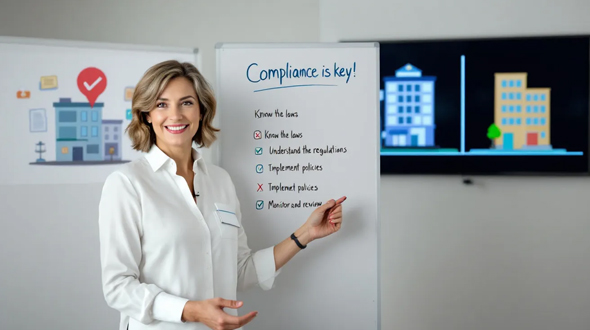Real estate investors often inquire, what does a commercial property manager do? A commercial property manager oversees the daily operations of commercial properties. They maintain property value, manage tenant relations, handle finances, ensure legal compliance, and oversee property improvements. This atlantacommercialroofingcontractors.com article details what a commercial property manager does.

Key Takeaways
- Commercial property managers are essential for maintaining and enhancing property value through regular inspections, repairs, and strategic capital improvements.
- Effective tenant relations, including communication and lease management, are crucial for sustaining high occupancy rates and tenant satisfaction.
- Financial management, including budget creation, rent collection, and compliance with legal regulations, is vital for ensuring the profitability and stability of commercial properties.
Maintaining and Enhancing Property Value
Maintaining and enhancing property value is a cornerstone of effective commercial property management. Regular maintenance and strategic improvements not only preserve the property’s condition but also enhance its market value and attractiveness to potential tenants. A commercial property manager plays a crucial role in this process by implementing tailored maintenance plans that include routine inspections, necessary repairs, and capital improvements.
Managing landscaping and curb appeal creates a positive first impression and ensures the property remains inviting.
Routine Inspections and Repairs
Routine inspections and repairs are key components of a property’s maintenance plan. Regular maintenance checks allow property managers to monitor the property’s condition and detect potential issues before they escalate into costly repairs. Addressing these issues promptly helps conserve property value over time, making necessary maintenance essential.

Coordinating necessary repairs after inspections ensures the property remains in optimal condition and meets tenants’ needs.
Capital Improvements
Capital improvements involve planning and overseeing major renovation projects that add value to the property and attract tenants. Planning these improvements requires considering market trends and environmental impacts to ensure they are beneficial and sustainable.
Smart building technology can further optimize property management, enhance energy efficiency, and provide real-time resource monitoring.
Landscaping and Curb Appeal
Landscaping and curb appeal play a significant role in the overall perception of commercial properties. Well-maintained landscaping enhances the exterior appearance of the property, contributing to a positive first impression for visitors and tenants. Regular maintenance keeps outdoor spaces inviting and ensures a favorable impression.
Commercial property managers often work with engineers, gardeners, and horticulturists to effectively maintain the landscape, tailored to the specific type of commercial property.
Managing Tenant Relations
Managing tenant relations is a critical aspect of commercial property management. Effective tenant management ensures high occupancy rates and tenant satisfaction, which are essential for the property’s success. Property managers act as the primary link between tenants and property owners, addressing tenant concerns, ensuring lease compliance, and fostering a supportive environment.
Maintaining healthy tenant relations boosts tenant satisfaction and retention, ultimately leading to maximum occupancy.
Communication and Dispute Resolution
Maintaining healthy tenant relations hinges on effective communication. Property managers serve as the primary point of contact for tenants, addressing concerns and resolving disputes efficiently. Being available to respond to property-related emergencies and resolving disputes promptly helps maintain a positive relationship with tenants. An assistant property manager can also play a crucial role in this process.

Regular communication, including tenant sentiment surveys, allows property managers to address concerns proactively and improve service delivery.
Lease Negotiations and Renewals
Lease negotiations and renewals are crucial for maintaining stable tenant occupancy. Property managers handle lease agreements precisely, ensuring all obligations are met and rents are collected promptly. They also negotiate leases and manage financial duties such as collecting rent, managing payments, and recording transactions, including lease management.
Complying with Fair Housing laws and implementing green leases encourages sustainability efforts and supports favorable lease terms.
Work Order Management
Work order management involves overseeing and responding to maintenance requests from tenants and internal teams. Timely responses to work orders are crucial for maintaining good tenant relations and ensuring a positive tenant experience.
Efficiently managing work orders helps address maintenance issues promptly and keeps the property in optimal condition.
Financial Management and Reporting

Financial management and reporting are vital aspects of commercial property management and asset management. Ensuring the property’s profitability involves tasks such as budgeting, rent collection, and financial reporting.
Commercial property managers help property owners achieve their financial goals through effective management and transparent fee structures. A property owner can enhance these efforts through a property manager’s commercial property management company.
Budget Creation and Management
Creating and managing budgets is a fundamental responsibility of commercial property managers. A well-managed budget ensures wise spending, maintains property value, and plans for future enhancements. Property managers require strong financial competence to organize ledgers, conduct profit analyses, track expenditures, and create budgets. These budgets typically include operational costs such as property taxes, insurance, and maintenance expenses.
Financial reports from property managers communicate financial status to property owners and include projections for future income and rental increases.
Rent Collection and Accounting
Managing lease payments and rent collection is a key component of financial operations in commercial property management. Timely rent collection is crucial for maintaining positive cash flow and ensuring property viability. Property managers handle these financial aspects, including any late payments or money owed, to ensure economic success and stability for the property.
Financial Reports for Owners
Financial reports created by property managers provide property owners with detailed information about the asset’s performance and financial health. The reports encompass various components. These include capital expenditure, cash reserve balances, bank reconciliations, and expenses.
Effective financial management includes preparing detailed reports that reflect the property’s financial performance and necessary adjustments.
Legal and Regulatory Compliance

Ensuring compliance with relevant laws, health regulations, and property regulations is critical to managing commercial properties. Properties must meet local, state, and federal regulations to avoid legal issues and fines.
Adherence to legal guidelines is a significant responsibility of commercial property managers.
Understanding Relevant Laws
Compliance with laws is essential for smooth property management operations. It is imperative for property managers to keep up with local, state, federal laws, building codes, and zoning regulations to ensure the property remains compliant. Knowledge of relevant laws, regulations, and industry trends is crucial for success.
In California, for example, property managers are required to have a real estate broker’s license.
Lease Enforcement and Eviction Processes
Enforcing lease terms and handling eviction processes are key responsibilities of commercial property managers. When tenants fail to comply with lease terms, property managers notify them of default and may start eviction proceedings.
Understanding landlord-tenant laws is essential for navigating security deposits and eviction rules effectively.
Risk Management and Insurance
Risk management and insurance are crucial for protecting the property and its owners from unforeseen financial losses. Identifying risks, implementing safety protocols, and ensuring proper insurance coverage maintain the property’s safety and financial stability.
Project Management and Property Improvements

Project management and property improvements are essential for enhancing the property’s value and functionality. Great property managers proactively identify improvement opportunities and consider market demands and environmental factors when managing properties upgrades.
Implementing energy-efficient systems can significantly enhance property value.
Overseeing Renovations and Upgrades
Overseeing renovations and upgrades is a key responsibility of commercial property managers. They bid out projects, manage annual vendor contracts, and ensure quality and cost-effectiveness.
Property managers collaborate with professionals like plumbers and interior designers to achieve desired functional and aesthetic outcomes.
Sustainable Practices
Implementing sustainable practices can significantly reduce operating costs and enhance marketability to eco-conscious tenants. Incorporating energy-efficient systems and adapting to market trends reduces operational costs and improves tenant satisfaction.
Essential Skills for Commercial Property Managers
Essential skills for commercial property managers include:
- Organizational skills
- Communication
- Customer service
- Financial acumen
These skills are critical for handling diverse challenges and ensuring the effective management of commercial properties.
These skills collectively contribute to maintaining healthy tenant relations, ensuring property maintenance, and achieving financial goals.
Organizational and Multitasking Skills
Organizational and multitasking skills are essential for commercial property managers to manage multiple tasks effectively. Effective time management and personal organization are crucial for handling the numerous property management responsibilities.
Communication and Customer Service
Effective communication and customer service skills are vital for interacting with tenants, staff, and clients. Active listening ensures tenant concerns are understood and addressed, while accurate reports keep all parties informed.
Acting on tenant feedback is essential for improving negotiating leases and adapting strategies for management.
Financial Acumen
Financial acumen is crucial for managing budgets, ensuring timely rent collection, and maintaining accurate financial records. Commercial property managers handle financial aspects to ensure economic success and provide detailed financial reports to owners.
This financial competence facilitates informed decisions and helps achieve a deep understanding of financial goals.
Choosing the Right Property Management Company

Choosing the right property management company significantly impacts the property’s success. Factors to consider include the company’s experience, expertise, and understanding of tenant dynamics.
A skilled property management company can ensure smooth operation, profitability, and tenant satisfaction by hiring a good property manager. Additionally, property management companies play a crucial role in maintaining these standards.
Evaluating Experience and Expertise
Evaluating a property management company’s experience and expertise ensures effective services. Companies with extensive experience managing similar properties are more likely to provide effective services.
Look for firms with a proven track record in properties similar to yours for better compatibility.
Checking References and Reviews
Checking references and reviews is essential for assessing the reputation and reliability of a property management company. Consulting references gauges a company’s track record and performance in managing similar properties.
Understanding the fee structures and services required offered ensures alignment with your investment goals.
Understanding Fee Structures
Understanding the fee structures of a property management company is critical to ensuring that your investment goals are met. Commercial property managers handle financial aspects to ensure the economic success of the property. Aligning fee structures with investment strategies helps maximize return on investment in commercial properties.
Commercial Property Manager Summary
In summary, a commercial property manager’s responsibilities are vast and varied, encompassing property maintenance, tenant relations, financial management, legal compliance, and project management. A good property manager ensures that the property remains in optimal condition, keeps tenants satisfied, and achieves the property owner’s financial goals. When choosing a property management company, evaluating their experience, checking references, and understanding their fee structures is crucial to ensure they align with your investment strategy. With the right property management team, your commercial real estate investment can thrive and grow.
Commercial Property Manager Frequently Asked Questions
What are the primary responsibilities of a commercial property manager?
The primary responsibilities of a commercial property manager include ensuring property maintenance, managing tenant relations, overseeing financial management, ensuring legal compliance, and supervising property improvements. These tasks are essential for the effective operation and profitability of commercial properties.
How do property managers contribute to tenant satisfaction?
Property managers significantly enhance tenant satisfaction by maintaining open communication, promptly addressing concerns, and ensuring the property is well-maintained. These actions contribute to a positive living experience for tenants.
Why is understanding fee structures important when choosing a property management company?
Understanding fee structures is crucial as it ensures that the services align with your investment goals and helps you avoid hidden costs that may adversely affect profitability. This knowledge empowers you to make informed decisions about the management of your property.
What role do routine inspections and repairs play in property management?
Routine inspections and repairs are essential in property management as they enable early detection of potential issues, thereby preserving the property’s condition and value over time. Maintaining a proactive approach ensures the property remains appealing and functional for tenants.
How do commercial property managers ensure legal and regulatory compliance?
Commercial property managers ensure legal and regulatory compliance by staying informed about relevant laws, building codes, and zoning regulations, ensuring that the property consistently meets all legal requirements.
(404) 220-9288